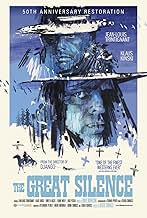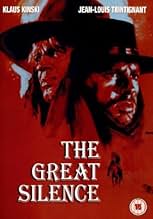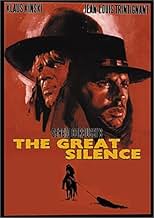Un pistolero muto difende una giovane vedova e un gruppo di fuorilegge contro una banda di cacciatori di taglie nell'inverno del 1898 e si svolge una lotta tesa.Un pistolero muto difende una giovane vedova e un gruppo di fuorilegge contro una banda di cacciatori di taglie nell'inverno del 1898 e si svolge una lotta tesa.Un pistolero muto difende una giovane vedova e un gruppo di fuorilegge contro una banda di cacciatori di taglie nell'inverno del 1898 e si svolge una lotta tesa.
- Premi
- 1 vittoria
- Gordon
- (as Jean Louis Trintignant)
- …
- Pauline Middleton
- (as Vonetta Mc Gee)
- Governor of Utah
- (as Carlo D' Angelo)
- Outlaw
- (non citato nei titoli originali)
- Man in Saloon
- (non citato nei titoli originali)
- Poker Player
- (non citato nei titoli originali)
- Hunter
- (non citato nei titoli originali)
Trama
Lo sapevi?
- QuizAccording to Sergio Corbucci, Marcello Mastroianni gave him the idea of a mute gunfighter when the actor told him that he had always wanted to do a Western, but unfortunately didn't speak English. When Corbucci first met Jean-Louis Trintignant, he learned that he didn't speak English either. Because he had a fascination with characters with a crippling weakness, Corbucci decided that this was the moment to turn the taciturn Spaghetti Western hero into a mute.
- BlooperVarious spelling mistakes in the title cards.
- Citazioni
Ending title card: The massacres of 1898, year of the Great Blizzard, finally brought forth fierce public condemnation of the bounty killers, who, under the guise of false legality, made violent murder a profitable way of life. For many years there was a clapboard sign at Snow Hill which carried this legend: MEN'S BOOTS CAN KICK UP THE DUST OF THIS PLACE FOR A THOUSAND YEARS, BUT NOTHING MAN CAN EVER DO WILL WIPE OUT THE BLOOD STAINS OF THE POOR FOLK WHO FELL HERE.
- Versioni alternativeTwo alternative endings were created for this film:
- A "happy" ending, in which Sheriff Burnett (having somehow survived being trapped under a frozen lake) rides into town and shoots Loco before he can kill Silence, allowing him to kill the remaining bounty killers. This ending was once believed to be shot for the North African and Japanese markets, but has since been revealed to have been created as an alternative solution for the producers, who wanted the film to have a "seasonal" (ie. Christmas) appeal.
- A lesser-known, "ambiguous" re-cut of the original ending with additional footage, in which Silence is wounded, but Loco gestures to his gang members to leave the saloon before they can kill anyone.
- ConnessioniFeatured in Western, Italian Style (1968)
The circumstances leading up to this showdown should, in a more conventional western, be pretty clean-cut. But what's impressive, if almost a little circumstantial, is that Corbucci puts in little unconventional markers along the way: the high-drama scene where Silence gets his hand burnt by a goon as foreshadowing for the ominous bounty hunter massacre, and for those little moments when life seems so easily killed off, particularly at the start. Silence, like in a Leone film, does have something of a gimmick as a killer, as he shoots off the thumbs of his targets. But Corbucci's drama isn't keened on incredible suspense sequences in operatic form or gallows humor. Even a sex scene for Corbucci has a tenderness to it that feels the work of someone trying to break out of squarely B-movie extremities and trying for something more. If it isn't altogether successful it's attributable to flaws scattered around: random 'soft-lighting' in the last act that is very distracting, a couple of plot points not totally clear even by the end, and Kinski looking sometimes like a pretty boy as much as a sadistic bounty hunter, plus Corbucci's tendencies to favor close-ups for more formulaic means as opposed to drawing out deeper emotions through a more keen system.
But even with Corbucci not being a 'great' director, he has a keen eye for Utah (if it is Utah, which it probably isn't), and the vast vistas of snow and fields in a plain sight that contrasts the sort of void sucking the characters in with the hopeless center of bounty hunters without the strongest opponent. And Morricone, as if it was like breathing, fleshes out scenes so well with his beautiful score, only slightly below the magnificence of a Leone picture. You may feel by the end that it's not the prettiest western you've ever seen, but it has that possibility in its low-budget blood-stained manner to stay with you long after it's over.
- Quinoa1984
- 4 lug 2007
- Permalink
I più visti
- How long is The Great Silence?Powered by Alexa
Dettagli
- Data di uscita
- Paesi di origine
- Lingua
- Celebre anche come
- The Great Silence
- Luoghi delle riprese
- Cortina d'Ampezzo, Belluno, Veneto, Italia(location scene)
- Aziende produttrici
- Vedi altri crediti dell’azienda su IMDbPro
Botteghino
- Lordo Stati Uniti e Canada
- 53.074 USD
- Fine settimana di apertura Stati Uniti e Canada
- 8.755 USD
- 1 apr 2018
- Lordo in tutto il mondo
- 60.500 USD
- Tempo di esecuzione1 ora 45 minuti
Contribuisci a questa pagina































